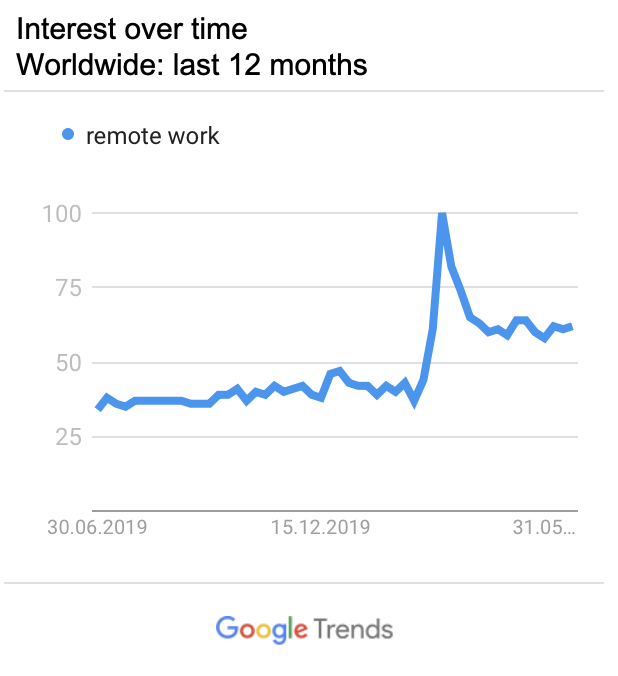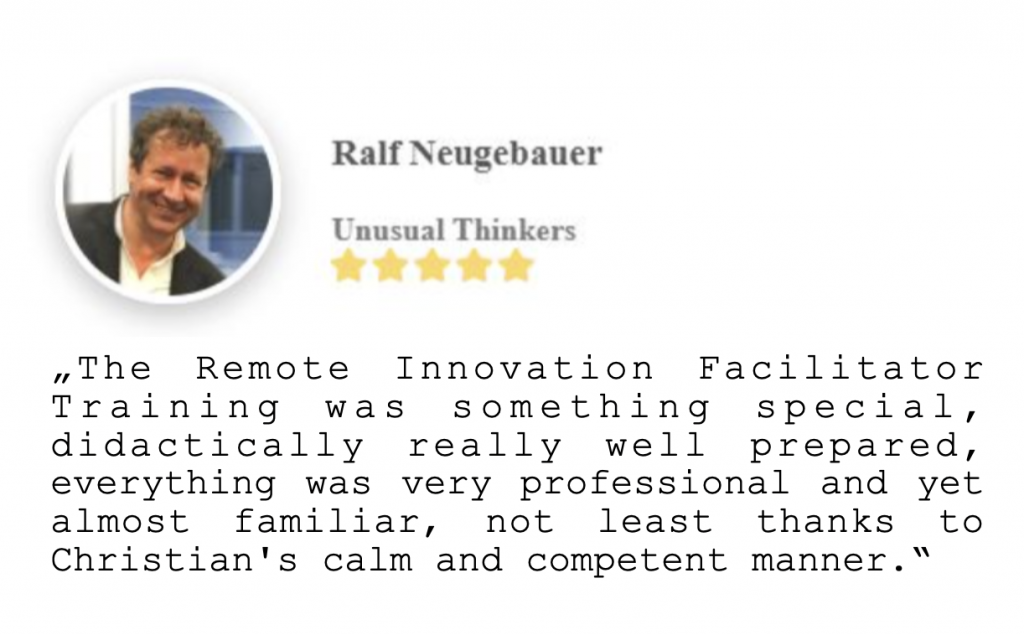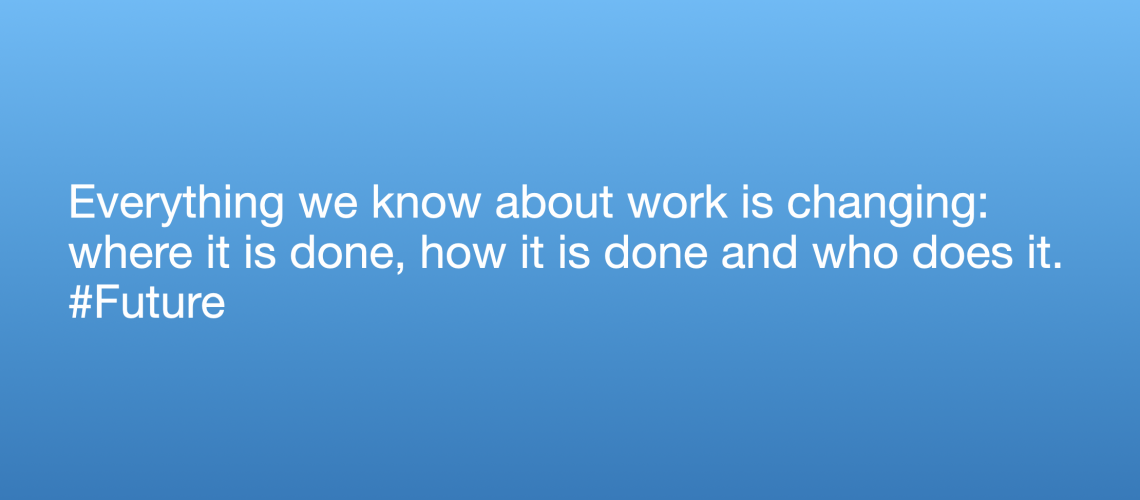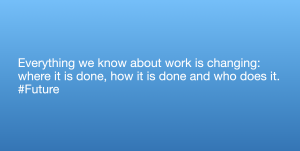It has been less than 3 months since the German government adopted comprehensive measures to combat corona and millions of people in Germany suddenly and unexpectedly found themselves in their home offices. This was also a special time for our verrocchio team, because we had planned numerous events in the last months. In addition to our Innovation Master in Florence and the verrocchio Summit in Düsseldorf, some dates of our training as Innovation Coach should take place.
The Lockdown – the beginning of an exciting journey
Many customers asked us already in the first week of the lockdown for tips on how to implement digital innovation workshops, as we have been working with digital workspaces in international projects for many years. We decided to make this knowledge available to other people and started the training as Remote Innovation Facilitator, which was actually planned to start in November 2020. In this format, participants experience the complete Design Thinking process in a digital team in 10 days, working on a concrete example project. As chance would have it, this project involved the development of a new toilet paper. 🧻☺️ By now, the 7th round of the training is taking place – also due to the many positive feedbacks from the previous participants, the classes are mostly fully booked.
Everyone works remotely – but nobody knows how to do it

In mid-March 2020, the term “remote work” became the word of the moment within a few days, and was also catapulted forward in Google search queries. Many started the first digital meetings with little initial knowledge. We received more and more inquiries from people who were basically interested in the topic of remote teams, but had no focus on the topic of innovation.
For us, this was the occasion to consider how we could impart basic experience in the field of remote moderation without having to work on an innovation project.
The answer to these considerations was the training as Remote Team Facilitator. While this was initially planned as a live event with 5 sessions, we quickly noticed that the participants came from different areas of work. On board were executives, team leaders, trainers, moderators – many out of the necessity of suddenly sitting in their home office and having to organize their teams. The level of previous knowledge was also correspondingly different. In some cases, the first training session for many was the first contact ever with a video meeting.
In order to be able to offer further training that provides exciting knowledge for both beginners and advanced remote workers, we have further developed the new Remote Team Facilitator as a hybrid learning concept. Comprehensive know-how in a digital learning environment with more than 16 modules and 2 live sessions for open questions and experiencing the digital workspace. Due to the high speed of change of the topic, the training is a verrocchio Lifetime Training, which also includes all future updates.
The last few weeks have led to us spending a lot of time in digital sessions that have produced exciting insights:
A digital meeting is more than a video conference
Many participants were not aware that digital collaboration only works well when different tools are combined. While a video meeting is often sufficient for a brief exchange among colleagues, this no longer works for cases where something is to be worked out together. Regardless of the question, however, it almost always means that I, as a moderator, have to think about how the different views and opinions of the participants can be collected and processed constructively. In addition to other moderation methods (note: please do not brainstorm in a video conference!) you should also think about using additional tools besides video software. (You can find a description of suitable tools, for example, in our article “Remote Work – these tools help to better organize collaborative work“). Basically, a day workshop can also be digitally implemented if I take the translated word “work” in the term “workshop” seriously. After all, digital meetings always work well when the focus is on interaction between the participants.
Without change even experienced moderators fail
Many managers and moderators start out in digital moderation with the idea that the methods and skills learned can be transferred 1:1 to digital formats. With this mindset, failure is often pre-programmed. In fact, adjustments in didactics and methodology are essential. If these are done correctly, the digital format often delivers significantly better results than the face-to-face meeting. Common mistakes are:
- long meeting times: The concentration performance of digital formats diminishes much faster than is usual for face-to-face meetings. Anyone who digitally implements a 4-hour meeting in the same form will end up with hardly any participants who are awake.
- Lack of interaction: Due to the high risk of distraction (e-mails are only a mouse click away) and the strenuous work on the screen, shorter work phases with a focus on participant activities are essential. Long-term presentations with slide bombardment should already be a thing of the past in presence meetings; in digital formats they can already be considered physical injury. 🚨
Digital First – a fundamental change in thinking
Some people see digital workshops only as a temporary phenomenon and will be surprised in the coming months how much has changed as a result of the Corona crisis. From all the conversations I have had over the past 3 months with participants in our courses, managers and HR experts, it is clear that virtual collaboration will play a much greater role in work organisation in the future. Therefore, a change in mindset is inevitable: While currently the question is often “How can I make my analog meetings digital”, in the future the question should be “How can I use the possibilities of digital technologies to achieve even better results in meetings and workshops?”

Digital First is the name of the new way of thinking (which is not so new anymore) and presupposes that people deal intensively and consciously with digital tools and feel safe there. Usually it doesn’t take long for the spark to fly and virtual collaboration to become not just an alternative but an essential part of one’s own method box.
This is just the beginning…
Anyone who has worked with digital collaboration tools in the last 3 months will have noticed that many apps have released new updates very quickly. Nearly every startup in the remote work area was surprised by the many new subscribers and was able to build up new development capacities due to the additional budget. It can be assumed that this will continue in the future and that the technical possibilities will increase even more. This makes it all the more important to hang on in there as a digital moderator even after the Corona period. We have solved this by inviting our participants to a joint discussion forum after the two Remote Facilitator training sessions. Here we and other participants will regularly publish new insights and experiences.
Did you know? The Remote Team Facilitator training is even a verrocchio Lifetime Training. This means that we permanently add new topics and insights to the content, the participants regularly benefit from current knowledge.



